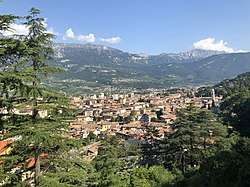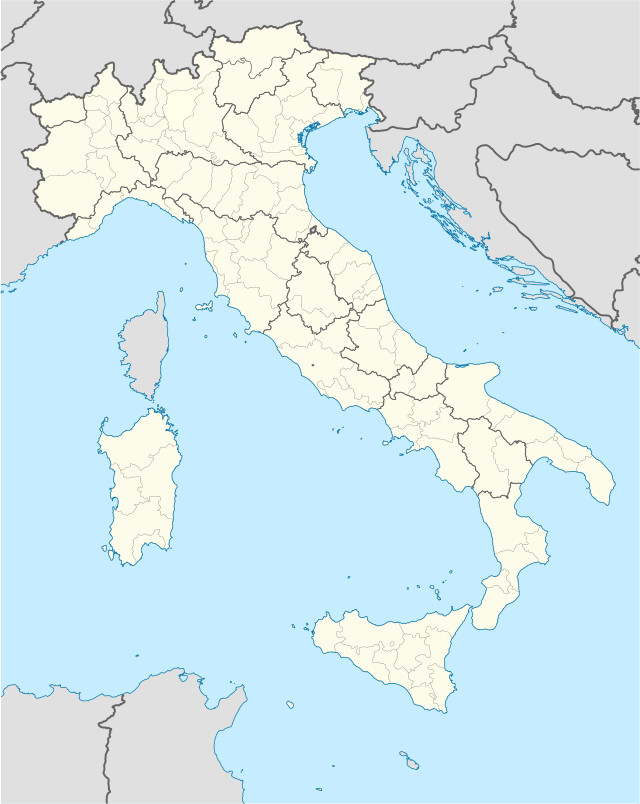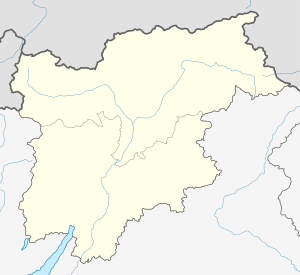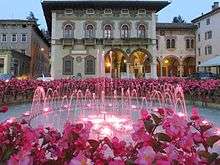Rovereto
Rovereto (Italian pronunciation: [roveˈreːto]; "wood of Cornish oaks") is a city and comune in Trentino in northern Italy, located in the Vallagarina valley of the Adige River.
Rovereto | |
|---|---|
| Comune di Rovereto | |
 Panorama of Rovereto, with Monte Cengialto (on the right) | |
 Coat of arms | |
Location of Rovereto 
| |
 Rovereto Location of Rovereto in Italy  Rovereto Rovereto (Trentino-Alto Adige/Südtirol) | |
| Coordinates: 45°53′N 11°3′E | |
| Country | Italy |
| Region | Trentino-Alto Adige/Südtirol |
| Province | Trentino (TN) |
| Frazioni | Borgo Sacco, Lizzana, Lizzanella, Marco, Mori Stazione, Noriglio, San Giorgio, Santa Maria, Sant'Ilario |
| Government | |
| • Mayor | Francesco Valduga |
| Area | |
| • Total | 50 km2 (20 sq mi) |
| Elevation | 204 m (669 ft) |
| Population (31 March 2018)[2] | |
| • Total | 39,915 |
| • Density | 800/km2 (2,100/sq mi) |
| Demonym(s) | Roveretani |
| Time zone | UTC+1 (CET) |
| • Summer (DST) | UTC+2 (CEST) |
| Postal code | 38068 |
| Dialing code | 0464 |
| Patron saint | Saint Mary of the Snow |
| Saint day | 5 August |
| Website | Official website |


History
Rovereto was an ancient fortress town standing at the frontier between the bishopric of Trento – an independent state until 1797 – and the republic of Venice, and later between Austrian Tyrol and Italy. During the Austrian time it was known by its German toponyms Rofreit and Rovereith.[3]
Geography
Rovereto is east of Riva del Garda (at the north-western corner of Lake Garda). Rovereto is the main city of the Vallagarina district.
The town is located at the southern edge of the Italian Alps, near the Dolomites. It is bordered by Monte Cengialto (686m above sea level) to the east.[4]
Main sights
- The castle, built by the counts of Castelbarco in the 13th–14th centuries, and later enlarged by the Venetians during their rule of Rovereto.
- The Italian War museum (Museo Storico Italiano della Guerra) is located inside the castle. The Italian War Museum was founded in 1921 in remembrance of the First World War and in it are preserved arms and documents relating to wars from the 16th to the 20th centuries.
- The mighty bell Maria Dolens, one of the largest outside Russia and East Asia, and the second-largest swinging bell in the world after the St. Peter's Bell of the Cologne Cathedral. Maria Dolens ("the grieving Virgin Mary") was built under the inspiration of a local priest, between 1918 and 1925, to commemorate the fallen in all wars, and to this day it sounds for the dead every day. Originally a patriotic rather than pacifist idea, it is today regarded as a shrine to peace.
- MART, the Museum of Modern and Contemporary Art of Trento and Rovereto offers temporary exhibitions, educational activities, and has a remarkable permanent collection.
- The Casa d'Arte Futurista Depero, Italy's only museum dedicated to the Futurist movement, containing 3,000 objects. The Casa d'Arte Futurista Depero is one of MART's venues. Closed for many years for extensive refurbishment, it reopened in 2009.[5]
In the area of Lavini di Marco footprints of dinosaurs have been found. The species have been identified as the herbivorous Camptosaurus and carnivorous Dilophosaurus.
Marco also hosts a large landslide which was mentioned by Dante Alighieri in his Divina Commedia: "Qual è quella ruina che nel fianco di qua da Trento l'Adice percosse, o per tremoto o per sostegno manco" (Inferno, canto XII).
Economy
In the past Rovereto was an important centre for the manufacture of silk fabrics. Currently, wine, rubber, chocolate, glasses and coffee are the town's main businesses.
Rovereto is the birthplace (1941) of Sferoflex eyeglasses, now taken over by Luxottica. Other relevant companies located in Rovereto are Marangoni Pneumatici, Sandoz Industrial Products Spa, Cioccolato Cisa, and Metalsistem. Rovereto is also home to Pama S.p.A machine tool builder.
Transport
Rovereto railway station, opened in 1859, forms part of the Brenner railway, which links Verona with Innsbruck.
People
- Armando Aste (born 6 January 1926), influential Italian alpinist of the postwar period
- Gaspare Antonio Cavalcabò Baroni (1682–1759) Baroque painter
- Fortunato Depero (1892–1960), artist
- Giacomo Gotifredo Ferrari (1763-1842), musician.
- Valerio Fioravanti (born 28 March 1958), founder of the neo-fascist terrorist group Nuclei Armati Rivoluzionari
- Maria Pia Gardini (1936–2012), entrepreneur and critic of Scientology
- Marco Martinelli (born 1965), a former volleyball player who earned 155 caps for the Italy men's national volleyball team
- Massimo Parziani (born 1992), Motorcycle racer
- Bianca Laura Saibante (1723—1797), poet
- Antonio Rosmini-Serbati (1797–1855), priest, philosopher and founder of the Institute of Charity (The Rosminians)
- Paolo Seganti (born 20 May 1965), actor, author
- Elena Tonetta (born 1988), archer and 2005 Junior European Champion
- Girolamo Tartarotti (born 1706), author
- Giuseppe Tomaselli (1758–1836), operatic tenor
- Gustavo Venturi (1830–1898), a bryologist whose herbarium is now kept at the Museo Tridentino di Scienze Naturali in Trento.
- Riccardo Zandonai (born 1883), composer
Twin towns – sister cities
Rovereto is twinned with:




See also
References
- "Superficie di Comuni Province e Regioni italiane al 9 ottobre 2011". Istat. Retrieved 16 March 2019.
- "Popolazione Residente al 1° Gennaio 2018". Istat. Retrieved 16 March 2019.
- Ignazio Putzu; Gabriella Mazzon (2012). Lingue, letterature, nazioni. Centri e periferie tra Europa e Mediterraneo. Milano. Franco Angeli. p. 332.
- Giacomoni, Francesco. "la zona industriale vista dal sentiero del Cengialto 686 m. slm and Monte Finonchio (1608 m above sea level) On the west side Rovereto is bordered by Monte Stivo (2059 m)". panoramio.com. Retrieved 17 November 2015.
- "Casa d'Arte Futurista Depero". "Quando vivrò di quello che ho pensato ieri, comincerò ad avere paura di chi mi copia" FD. Il Museo di Arte Contemporanea di Trento e Rovereto ("Mart"). Retrieved 2 September 2017.
External links
![]()
- Official website
- Mart, Museo di Arte Moderna di Trento e Rovereto
- Blog OcchioDiRovereto
- Massa Critica Rovereto
- Italian War Museum in Rovereto
- ViaggiaRovereto(Android Application) -- Implemented as part of SmartCampus project, the research project founded by TrentoRise, UNITN, and FBK
